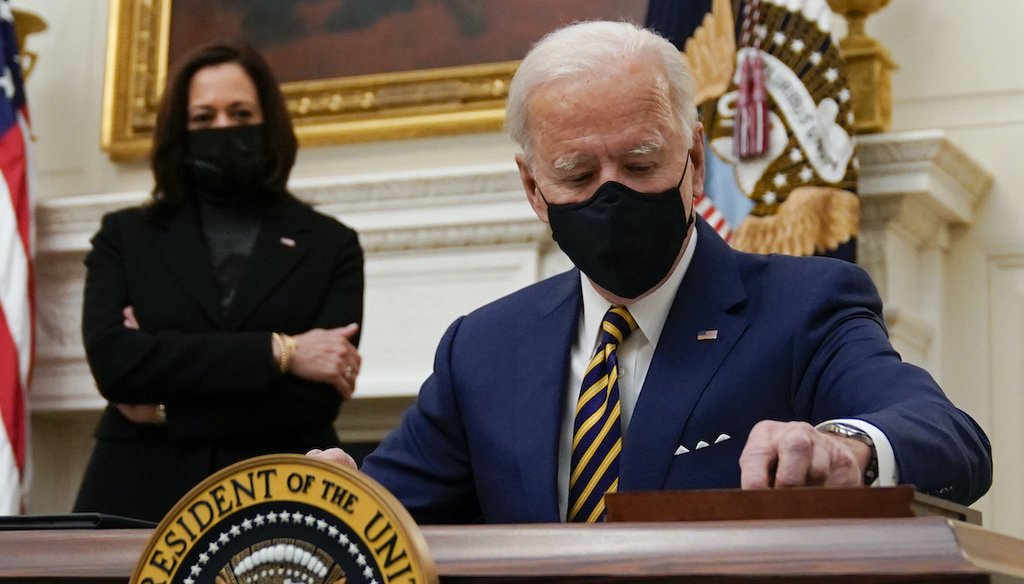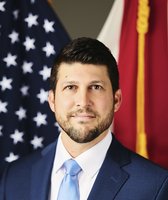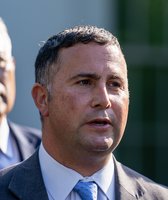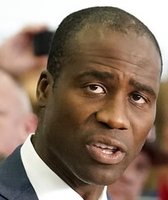Get PolitiFact in your inbox.

President Joe Biden signs executive orders on the economy in the State Dining Room of the White House, Friday, Jan. 22, 2021, in Washington. Vice President Kamala Harris looks on at left. (AP)
If Your Time is short
-
ISIS, which took credit for a twin suicide bombing in Baghdad, didn’t simply reappear — it never vanished. There is no credible evidence that Biden sent military convoys to the Middle East
-
The Biden administration halted for review a Trump rule that was to take effect Jan. 22 requiring certain clinics to pass on drug discounts to patients. But the rule’s effect for patients is in dispute.
-
Some energy prices went up slightly in the last week, some did not, and most are down from a year earlier.
-
COVID-19 cases and deaths remain high, but have declined in recent weeks.
-
Biden canceled the construction of the Keystone XL pipeline via executive order. and TC Energy Corp. said it will lay off “thousands” of union workers as a result. The pipeline would have provided far fewer permanent jobs.
With barely a week under his belt as president, Joe Biden has apparently already caused a lot of problems for the country, at home and abroad, according to a viral Facebook post.
The post claims that, so far under Biden:
"ISIS has miraculously appeared again, we are back to sending military convoys to the middle east, drug prices were raised for the most vulnerable, energy prices rose, some of the highest COVID death rates, thousands of union jobs killed."
The post was flagged as part of Facebook’s efforts to combat false news and misinformation on its News Feed. (Read more about our partnership with Facebook.)
Some of the assertions are inaccurate. Others require more information and context. Let’s take a look.
"ISIS has miraculously appeared again"
This is wrong. ISIS, the Islamic militant group that seized control of territory in Syria and Iraq starting in 2014, has largely fizzled out over the last few years but it was never completely defeated.
The claim comes after ISIS claimed responsibility for a twin suicide bombing on Jan. 21 in Baghdad that killed over 30 people. The bombing is the first the terrorist group has claimed in a few years.
But ISIS was not inactive during that time. In August 2020, Vladimir Voronkov, the United Nation’s counterterrorism chief, warned that more than 10,000 Islamic State fighters remained active in Iraq and Syria and said the group’s activity had increased throughout the year.
Voronkov said that pandemic lockdowns reduced the risk of terrorist attacks, but noted "a continued trend of attacks by individuals inspired online and acting alone or in small groups, which could be fueled by ISIL’s opportunistic propaganda efforts during the COVID-19 crisis."
Will Todman, an associate fellow in the Middle East Program at the Center for Strategic and International Studies, said ISIS activity is not a new problem. "ISIS has not miraculously appeared again," Todman wrote in an email. "ISIS has been steadily increasing its activities in eastern Syria, and this week's attacks are simply the latest in a trend which began during President Trump's administration."
"We are back to sending military convoys to the Middle East"
There is no credible evidence that Biden sent military convoys to the Middle East, and multiple foreign policy experts said they aren’t aware of any new deployments to the region.
"President Biden and his senior national security team have all expressed support for reducing the United States' military footprint in the Middle East, and there have been no reports of new forces being sent to the region during the first days of the Biden administration," Todman said.
The claim may stem from a Jan. 22 story by a website called i24news.com, which said a convoy of 40 U.S. trucks and armored vehicles entered Syria from Iraq. The article says its source was the Syrian government’s State News Agency, SANA. The Syrian regime opposes U.S. presence in Syria and experts say it has an interest in stoking fears that the U.S. is occupying Syrian territory and stealing Syrian oil.
But the movement of convoys between Iraq and Syria is considered routine, as the U.S. often uses the corridor to transfer equipment and supplies.
"Drug prices were raised for the most vulnerable"
This is complicated, but there is no evidence that drug prices were raised due to any actions Biden has taken so far.
The claim appears to derive from a freeze that the Biden administration implemented on federal agency rules that had not gone into effect as of Jan. 20, 2021. One of those pending rules is a Trump administration drug policy that requires community health centers to pass on insulin and epinephrine discounts to patients, or risk missing out on federal grants.
The freeze is part of Biden’s effort to scrutinize and review Trump administration health policies. It requires the pending final rules to be delayed at least 60 days so the new administration can review, revise or possibly rescind them.
The drug policy rule, which was finalized in December and scheduled to take effect on Jan. 22, is now delayed until at least March 22, the Department of Health and Human Services announced.
Supporters of the Trump rule argue it would help patients who struggle to pay for expensive insulin and allergy medications, but the health centers and other groups pushed back on it, saying it’s an administrative burden that may do more harm than good.
The National Association of Community Health Centers said the rule reflects "a fundamental misunderstanding" of federally qualified health centers and the 340B drug discount program.
"It would accomplish the opposite of what the Trump Administration intended — ultimately making it harder for health centers to provide affordable life-saving services and prescription drugs — especially during the pandemic, the group wrote in a Jan. 25 news release.
The regulation only affects medications purchased through the 340B drug discount program at health centers, the association says, not the overall prices of insulin and Epipens across the country.
The 340B drug program allows community health centers to pocket profits from the sale of discounted drugs to patients. The clinics bill insurers and get to keep the difference between the mandated price (usually about half of the full cost) and the insurer reimbursement.
"This rule was going to be really bad for community health centers, who were already providing lots of free care to patients. So yes, technically freezing the rule could make some patients worse off," Sayeh Nikpay, associate professor of health policy and management at the University of Minnesota School of Public Health, wrote in an email.
"But keeping the rule would have possibly made a whole bunch of patients worse off by closing off 340B revenue to health centers and possible resulting in cuts in services."
"Energy prices rose"
This is misleading and lacks context. Some energy prices went up slightly in the last week, some did not, and most are down from a year earlier.
For example, during the week of Jan. 18 — the period that includes the start of Biden’s presidency — the national average for a gallon of regular gasoline rose by 2 cents, to $2.39, according to the American Automobile Association. It was 16 cents higher than a month earlier, but 15 cents less than a year before.
Florida had the steepest increase in that week, 10 cents.
Other energy prices fluctuate. Crude oil went up by 41 cents a barrel in the week since inauguration, and is down $1.42 from a year earlier, according to the U.S. Energy Information Administration. Natural gas is down 13.5 cents per million BTUs from a week earlier, and up 70.9 cents from a year earlier. Retail diesel is up 2 cents a gallon from the week before, and down 29.4 cents from a year earlier.
"Some of the highest COVID death rates"
COVID-19 death rates are undeniably high in the U.S., but there is no evidence that Biden, who hasn’t yet been in the job for a full week, has had enough time in office to impact those metrics.
While the figures continue to shift, deaths and cases attributed to the disease have declined in the U.S. over the last couple of weeks. The nation is recording just under 3,100 deaths a day on average, down from more than 3,350 less than two weeks ago, according to a Jan. 26 report by the Associated Press. New cases are averaging about 170,000 a day after peaking at almost 250,000 on Jan. 11.
The Centers for Disease Control and Prevention notes on its website that such declines "should be interpreted with caution" because of reporting delays associated with the holidays and rises in the numbers of illnesses.
This appears to be reflected in the daily data. For example, there were 4,383 COVID-19 deaths recorded on the day of his inauguration. Six days later and the number is at 1,891.
"Thousands of union jobs killed"
PolitiFact has rated other variations of this claim Half True.
On his first day in office, Biden signed an executive order revoking the permit for the Keystone XL pipeline, halting its construction in the U.S.
TC Energy Corp., the pipeline developer, said it will lay off "thousands" of union workers because of the order. The company’s president said the layoffs would number more than 1,000. The company estimated in October that the pipeline would employ 11,000 Americans in 2021, generating more than $1.6 billion in wages.
Both TC Energy and the State Department have said the majority of those jobs would have been temporary. A 2014 report found that the company would need only 50 employees to maintain the Keystone XL pipeline once it’s finished, 35 of them permanent.
Our Sources
Facebook post, Jan. 25, 2021
PolitiFact, Experts say Trump deserves some credit for ISIS decline, but it’s not completely defeated, July 15, 2020
NPR, Twin Suicide Bombings In Baghdad Market Kill At Least 32, Wound Over 100, Jan. 21, 2021
Military Times, Over 10,000 Islamic State fighters active in Iraq, Syria as attacks ‘significantly’ increase: UN, Aug. 25, 2020
I24news.com, US military convoy enters northeast Syria: report, Jan. 22, 2021
Modern Healthcare, HHS freezes rule targeting community health centers' drug discounts, Jan. 21, 2021
Federal Register, DEPARTMENT OF HEALTH AND HUMAN SERVICES 42 CFR Part 51c , Accessed Jan. 25, 2021
National Association of Community Health Centers, President Biden Freezes Insulin/Epipens Regulation Harmful to Community Health Centers and Patients, Jan. 25, 2021
American Automobile Association, NATIONAL AVERAGE INCREASES SLIGHTLY AMID HIGHER GAS DEMAND, Jan. 22, 2021
U.S. Energy Information Administration, Accessed Jan. 26, 2021
Centers for Disease Control and Prevention, Trends in Number of COVID-19 Cases and Deaths in the US Reported to CDC, by State/Territory, Accessed Jan. 25, 2021
Centers for Disease Control and Prevention, Key Updates for Week 2, ending January 16, 2021, Accessed Jan. 26, 2021
Associated Press, US virus numbers drop, but race against new strains heats up, Jan. 26, 2021
PolitiFact, How Biden’s Keystone XL pipeline executive order affects American jobs, Jan. 21, 2021
PolitiFact, Facebook post laments Biden’s first actions with false claims, Jan. 25, 2021
Email interview, Sayeh Nikpay associate professor of health policy and management at the University of Minnesota School of Public Health, Jan. 25, 2021
Email interview, Will Todman, an associate fellow in the Middle East Program at the Center for Strategic and International Studies, Jan. 25, 2021
Email interview, Michael O'Hanlon, a foreign-policy specialist at the Brookings Institution, Jan. 25, 2021












































